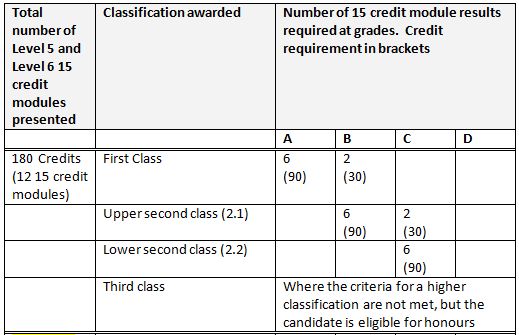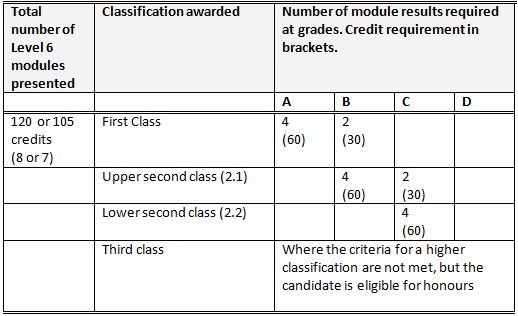
Registry Services
Registry Services
- Home
- Regulations and Procedures
- Academic Year Dates
- Student Records
- Assessment
- Appeals and Complaints
- Graduation
- Programme Advisory Service
- Data Management Unit
- Student Handbooks
- Timetabling
-
FAQs
- Anonymous Marking
- Academic Appeals
- Awards
- Complaints
- Council Tax
- Exam Boards
- Examinations
- ID Cards
- Dissertations
- Module Selections
- National Student Survey
- Programme Advisory Service
- Registration
- Results and Reassessment
- Submission of coursework
- Timetabling - Staff queries
- Timetabling - Student queries
- Changing course
- Replacement Documents
- Bank / Student status letter
- Changing modules
Awards
Awards
What do I need to be awarded a degree?
To be awarded an honours degree you will need to meet the following requirements:
To pass a total of 360 credits including 30 credits from the Level 6 Independent Study
Most students achieve this total credit requirement by passing 120 credits at levels 4, 5 and 6 but the rules for some courses permit some flexibility but all courses require students to:
To pass at least 120 credits at level 4 and
To pass at least 120 credits at level 6
The full flexibility is described in the formal regulations.
How is my degree classification calculated?
All undergraduate degree courses awarded from September 2014 are governed by the following regulations. The methodologies used to calculate degree classification will depend on the year of entry to Level 4.
Classification of Undergraduate Degree with Honours (for students admitted prior to 2022/23)
Using 15 and 30 credit modules, the Honours degree classification will be calculated two ways, and the Board of Examiners will confirm whichever of the two methods results in the higher classification. For the majority of students the classification will be the same using both methods.
When a result is for a 30 credit module rather than 15 credits, the grade achieved will be used twice e.g. a grade B in MOD1001 which is a 30 credit module will count as two B grades in the calculation.
Method 1: classification is determined on the profile of the best four grades (60 credits) achieved at Level 5 and the best 8 grades (120 credits) at Level 6:

Method 2: classification is determined on the profile of the best 8 grades (120 credits) at Level 6:

When a result is for a 30 credit module rather than 15 credits, the grade achieved will be used twice e.g. a grade B in MOD1001 which is a 30 credit module will count as two B grades in the calculation.
Classification of Undergraduate Degree with Honours (from entry to Level 4 in 2022/23)
Using 15 and 30 credit modules, the Honours degree classification will be calculated two ways, and the Board of Examiners will confirm whichever of the two methods results in the higher classification
Method One:
Classification determined on the profile of 120 credits attained at Level 5 and 120 credits at Level 6. Level 5 and Level 6 grades are weighted on a ratio of 1:2.
a) Candidates will be awarded a first class degree, where they have attained an average grade point of 16.25 or higher from 120 credits at Level 5 weighted at 33.33% and from 120 credits at Level 6 weighted at 66.67%. Candidates must also achieve a minimum of 50% of graded credits at grade A- or higher at Level 6.
b) Candidates will be awarded an upper second class degree, where they have attained an average grade point of 13.25 or higher from 120 credits at Level 5 weighted at 33.33% and from 120 credits at Level 6 weighted at 66.67%. Candidates must also achieve a minimum of 50% of graded credits at grade B- or higher at Level 6.
c) Candidates will be awarded a lower second class degree, where they have attained an average grade point of 10.25 or higher from 120 credits at Level 5 weighted at 33.33% and from 120 credits at Level 6 weighted at 66.67%. Candidates must also achieve a minimum of 50% of graded credits at grade C- or higher at Level 6.
d) Candidates will be awarded a third class degree, irrespective of their other module results, where they have not fulfilled rules (a), (b) or (c), but are eligible for the award of an honours degree.
Where a student has fewer than 120 credits at level 5 or Level 6, due to, for example, RPL, modules graded on a Pass/Fail basis, having taken additional Level 4 modules, the average grade point will be calculated using the remaining graded modules.
Method Two:
Classification determined on the profile of 120 credits attained at Level 6 only.
a) Candidates will be awarded a first class degree, where they have attained an average grade point of 16.25 or higher from 120 credits at Level 6. Candidates must also achieve a minimum of 50% of graded credits at grade A- or higher at Level 6.
b) Candidates will be awarded an upper second class degree, where they have attained an average grade point of 13.25 or higher from 120 credits at Level 6. Candidates must also achieve a minimum of 50% of graded credits at grade B- or higher at Level 6.
c) Candidates will be awarded a lower second class degree, where they have attained an average grade point of 10.25 or higher from 120 credits at Level 6. Candidates must also achieve a minimum of 50% of graded credits at grade C- or higher at Level 6.
d) Candidates will be awarded a third class degree, irrespective of their other module results, where they have not fulfilled rules (a), (b) or (c), but are eligible for the award of an honours degree.
The rules are defined formally in the regulations. Details can be found on the following pages:
I achieved a lower second honours degree and have noticed that I was close to getting an upper second. Can I resit some modules to raise my grade?
Your degree classification will have been calculated using the two methods outlined the Undergraduate Regulatory Framework (the Annex at the end of the document provides a useful summary.) with the best outcome being presented to the Board of Examiners.
The regulations state "Retrieval of failure in a module is permitted only after the module has been failed and is not available to improve a grade."
- Home
- Regulations and Procedures
- Academic Year Dates
- Student Records
- Assessment
- Appeals and Complaints
- Graduation
- Programme Advisory Service
- Data Management Unit
- Student Handbooks
- Timetabling
-
FAQs
- Anonymous Marking
- Academic Appeals
- Awards
- Complaints
- Council Tax
- Exam Boards
- Examinations
- ID Cards
- Dissertations
- Module Selections
- National Student Survey
- Programme Advisory Service
- Registration
- Results and Reassessment
- Submission of coursework
- Timetabling - Staff queries
- Timetabling - Student queries
- Changing course
- Replacement Documents
- Bank / Student status letter
- Changing modules